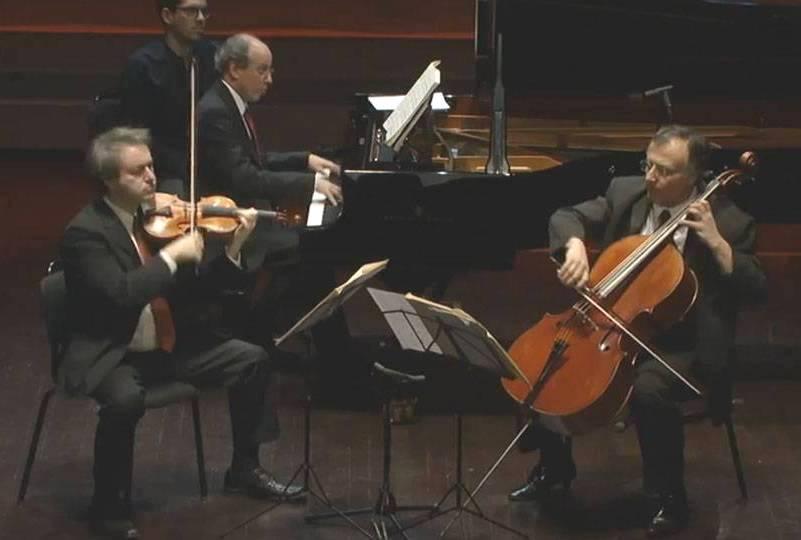Some chamber ensembles flourish through creative conflict, contrast and tension. Others streamline their approach, not so much relinquishing individuality as allowing the best of each to blend into more than the sum of their parts. The Trio Shaham Erez Wallfisch has grown, in its five-year existence, to be one of the latter.
Partly the secret of its success could be that the three musicians – British cellist Raphael Wallfisch with two Israeli colleagues, pianist Arnon Erez and violinist Hagai Shaham – are not only old friends, but long-experienced chamber music players, each with a wealth of understanding to contribute. However full-blooded their music-making – and for those who love “golden age” style this performance proved a real feast for the ears – they never get in the music’s way. It flows out of them unimpeded, as if balancing a piano trio were the easiest thing in the world, which goodness knows it is not.
These performers evoke musical values that today are beginning to seem “old school”, yet are as sterling-solid as ever. Erez is the most self-effacing of virtuosi, delivering glitter and dazzle whenever these works’ highly demanding piano parts require it but remaining ice-cool throughout, his tone always singing and translucent. Shaham’s sound recalls the great violinists of the mid 20th-century: rich and gorgeous, yet never sugary, his use of portamenti judiciously applied. Wallfisch’s cello seems virtually an extension of himself as he blends into vivid musical conversations or briefly takes centre stage to bowl out the big tunes, of which this programme provided plenty. There’s feeling at all times, yet it’s never sentimental or gushing; a genuine eloquence plus sensitivity rooted in strength are qualities that pull their weight throughout.
Arensky’s is possibly the best Russian piano trio of all, tautly constructed and full of inspiration
This programme involved three of the genre’s greatest works, plus a shorter piece that packs an emotional punch above its weight. Beethoven's Ghost Trio set the tone for much of the evening: tempi were well-nigh ideal, the outer movements never rushed yet full of energy, the slow movement casting its hushed spell without dragging any spectre’s sheets around. Moments of inspiration included the slackening of pace at the start of the opening movement’s coda, as if for just a few seconds the three could draw breath to take stock of Beethoven's genius with the rest of us.
Anton Arensky’s Piano Trio No 1 in D minor was created in memory of the composer’s friend Karl Davïdov, a celebrated cellist, and forms part of a slightly puzzling tradition among Russian composers to write piano trios by way of memorials. Tchaikovsky’s sole trio and both of Rachmaninov’s are more famous examples, but Arensky’s is possibly the best of them all, tautly constructed and full of inspiration, its emotional range extending from ferocious darkness in the finale to the high spirits of its scherzo, the latter delivered with a real twinkle in the eye.
After the interval Rachmaninov's very early, one-movement Trio élégiaque No 1 offered a powerful dose of exquisite melancholy before the trio let rip with the magnificence of Brahms's C major Trio Op 87. It’s a piece that suits this group down to the last semiquaver, matching maturity, assurance, technique and good nature throughout its journey. Notable qualities that leapt out of this performance included the choice of contrasting palettes in the scherzo, the long lines of violin and cello offsetting the whirling interjections of the piano, and a breathtaking episode in the finale in which Erez’s piano tone turned utterly luminous, as if by magic.
An encore of Fritz Kreisler’s Marche Miniature Viennoise, in the arrangement for trio that the violinist-composer made to play with his cellist brother, sent us all home in an upbeat and gloriously central European spirit.
But perhaps the most important figure of the evening was in the audience. This concert was dedicated, in the most discreet way – no announcements, no programme credits – to Wallfisch’s mother, Anita Lasker Wallfisch, for her 90th birthday. Lasker Wallfisch survived Auschwitz thanks to her cello playing – her memoir, Inherit the Truth, is required reading – and is well known for her eloquent lectures and essays on her experiences. She remains a powerhouse in her own right.














Add comment